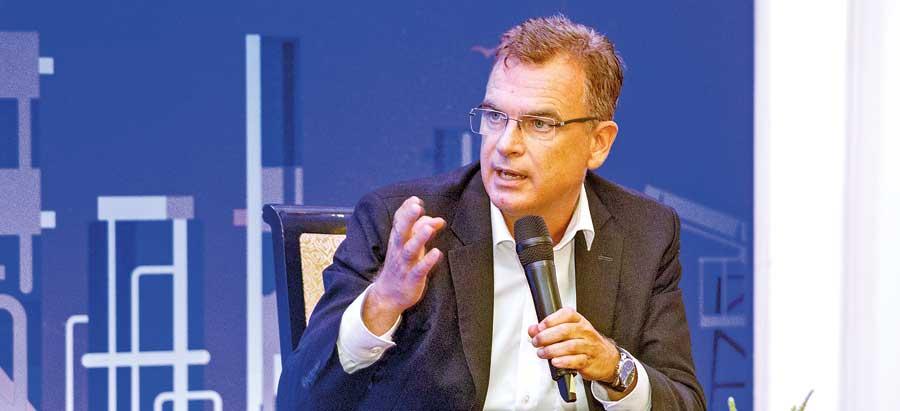Reply To:
Name - Reply Comment
Last Updated : 2024-04-29 13:23:00
Fuel price subsidies benefit mostly 30% wealthiest in Sri Lanka

Andreas Hergenröther
PPPs usually increase transparency in the use of funds, reducing opportunities for corrupt practices by releasing accessible information to the public domain, media, NGOs, and the private sector participants themselves
When opting for privatisation it is of crucial importance to ensure fair and free competition, avoid monopolies and ensure consumer protection
PPP and privatisation should be openlydiscussed in order to improve mutual understanding and if possible, to achieve a social consensus
CPC should be somehow enabled to cover currency risks through hedging and other financial services
Competing aviation fuel producers should be allowed to enter the Sri Lankan market in order to provide a continuous supply of aviation fuel. The monopoly of CPC in the field of aviation fuel should be abolished
Andreas Hergenröther, a German economic expert with speacial knowledge about Asia, shares his insights on the merits of Private Public Partnership (PPP) models for Sri Lanka to revive the economy. He underscores this in the wake of efforts being initiated by the government to reform public enterprises as part of its programme with the International Monetary Fund (IMF).
Mr. Hergenröther is the Joint Managing Director and Head of Market Entry and Sustainability of JAAR Corporate Solutions. He has a profound working experience in foreign trade promotion of more than 23 years in leading positions in Asia, the MENA-Region and Europe. He holds a master’s degree in German law. As the former Chief Delegate of German Industry and Commerce in Sri Lanka and CEO of various German Chamber offices in countries such as Saudi Arabia, Egypt, and Algeria he has indepth knowledge of market entry support and strategic political advocacy. During his long international career, he has been the initiator and renowned moderator of dialogues between high-ranking decision-makers in business and politics.
 Q: How important is it to have PPP model to revitalise loss-making state institutions?
Q: How important is it to have PPP model to revitalise loss-making state institutions?
PPPs can help both to meet the need and to fill the funding gap. PPP projects often involve the private sector in arranging and providing finance. This frees the public sector from the need to meet financing requirements from its own revenues (taxes) or through borrowing. This is an advantage where the public sector is facing limits on how much capital it can raise, as in India.
By shifting the responsibility for finance away from the public sector, PPPs can enable more investment in infrastructure and increased access to infrastructure services.
Using private sector finance also allows the public sector to move large capital expenditure programmes ‘off balance sheet’. This has been a motivating factor for PPPs in countries where the constraint on finance is a government commitment to a borrowing (ie. public debt) cap. The risk allocation and the associated performance rewards and penalties create incentives in the PPP contract encouraging the private sector to be more efficient at each stage of the project. By shifting risks to private partners, the public sector is able to limit its own exposure to cost escalation.
Competition is introduced during the bidding stage by bringing the benefits of market procurement if the project is well specified in terms of output requirements. Then each private sector bidder has an incentive to produce an innovative response and to minimise costs.
PPPs usually increase transparency in the use of funds, reducing opportunities for corrupt practices by releasing accessible information to the public domain, media, NGOs, and the private sector participants themselves.
A well-designed PPP process based on competitive bidding following international best practice procedures can bring procurement out from behind closed doors.
Furthermore, PPPs ensure higher quality and timely provision of public services.
Mostly investment projects are implemented in due terms and do not impose unforeseen public sector extra expenditures.
Specialised proven private sector expertise and experience are utilised in PPP project implementation. Appropriate PPP project risk allocation enables to reduce the risk management expenditures.
Q: Instead of total privatisation, why is it good to have PPP?
The privatisation is a transfer of ownership of public assets permanently to the private sector. This transfer is also done under different methods. However, under the PPP, the
government is constantly liable to perform certain tasks while the intervention of the private sector is obtained in different modes.
In my opinion, we cannot state that PPPs are more suitable than privatisation. It depends very much on the sector (transport, electricity generation and distribution, petroleum importation, refining and distribution, health etc.) and the activity (production, service, infrastructure etc.) that should be privatised. If the activity is of strategic importance for the population and national interests, PPPs might be more suitable. When opting for privatisation it is of crucial importance to ensure fair and free competition, avoid monopolies and ensure consumer protection.
Q: You recently worked out a report on Ceylon Petroleum Corporation. What recommendations have you made to the government?
In our report which was published in August 2022 in cooperation with the Friedrich Naumann Foundation of Freedom we have given the following recommendations:
a. Discuss openly sector-related PPP-models and privatisation with all stakeholders such as government, trade unions, related associations as well as banks and potential investors
PPP and privatisation should be openly discussed in order to improve mutual understanding and if possible, to achieve a social consensus.
b. Evaluate and Reduce Subsidies
According to a World Bank study, the current subsidising of fuel prices benefits mostly the 30% wealthiest in Sri Lanka due to their high fuel consumption. If maintaining subsidies a more need-oriented approach focusing on the poorer part of the population should be followed.
c. Minimise Currency Risks and Finance Costs
CPC should be somehow enabled to cover currency risks through hedging and other financial services. In addition, the conversion of US Dollar Loans to Rupee loans and settling using Rupee collection is another option.
It is to provide CPC autonomy to purchase US Dollars at competitive rates from all licensed commercial banks.
d. Increase Liquidity
That is to regularise the credit management policy, search for long-term funding facilities and recover subsidy element receivable without delay from the Government.
Currency losses and financial costs are major contributors to CPC ́s losses. In 2020 currency losses and finance costs reached Rs. 43 billion. In June 2022 according to the outstanding debts of CPC reached about USD 700 million. In 2022, the Sri Lankan currency depreciated by about 80%. Losses and liabilities are continuously increasing.
A mechanism to cover currency risks has not been established. Therefore, currency losses
continue to increase in 2022.
e. Introduce a transparent pricing mechanism that covers all costs
f. Breaking the monopoly of aviation fuel
Competing aviation fuel producers should be allowed to enter the Sri Lankan market in order to provide a continuous supply of aviation fuel. The monopoly of CPC in the field of aviation fuel should be abolished. It will encourage foreign investors to set up operations in Sri Lanka. Hence, prices of aviation fuel could be more competitive encouraging foreign airlines to increase flights to Sri Lanka.
g. Allow fair and free competition for fuel suppliers while enforcing a transparent Anti- trust legislation.
h. Increase transparency and good governance
During the peak of the fuel crisis in June 2022, the need to install a fully cost-reflective pricing mechanism became evident. A transparent price-building mechanism could serve in the future to introduce economically sustainable market prices and minimise losses of CPC.
The government should promote fair competition by increasing the number of fuel suppliers in order to guarantee continuous fuel supply with competitive prices.
To avoid new monopolies, the Sri Lankan government should ensure fair and free competition through transparent enforceable Anti-Trust-legislation.
There is a lack of available economic data in the case of CPC. This prevents proper monitoring and analysis of various actions resorted to by the government and hinders future planning. Therefore, annual reports, external audits etc. of CPC should be published transparently. CPC should be under the same obligations as publicly listed companies in Sri Lanka. Price building, purchasing and subsidy mechanisms should be transparent. Whistle-blowing procedures
should be enabled especially with regard to procurement procedures and corruption.
i. Minimise production risk
It is needed to upgrade the refinery to meet the latest technological advancements and increase the storage capacity to store crude oil and the output.
It is also required to establish a new refinery with the latest state-of-the-art technology.
j. Increase storage capacities
That is to enhance the storage capacity to maintain stocks when prices go down in the global market.
k. Increase efficiency of human resources
Due to CPC ́s essential function in the Sri Lankan economy, there is a need to ensure that people of skill, proven competence, and experience will be appointed to both the Board of Directors and the key management positions.
In 2017, there were three different Chairmen, whilst in 2018, there were two separate Chairmen. An organisation, as large as CPC, cannot function effectively without continuity. In many cases, CPC-Chairmen haven’t had sector-related experience. Therefore, it is recommended to plan leading positions in a target-related way with a long-term vision.
Q: How do you compare the situation in Sri Lanka with those countries where you have worked in the implementation of PPP models?
Until now, Sri Lanka is still at an early stage when it comes to the implementation of PPPs and privatisation. Since the 80s many European countries have continuously privatised or implemented PPP-models in different fields such as electricity generation and distribution, transport, infrastructure etc.
I am patriot Sunday, 23 October 2022 06:16 PM
Glad to see DailyMirror had journalist do the interview, and also published this article. A lot of problems come to light by way of the report (answer to Q3) recommendations to increase/minimise (reduce) various things. Answers to Q1, Q2, and Q4 is a lot about PPP, however, why something is of strategic importance should be debated. Democratic countries own very little business, or things of strategic importance related to business! Sri Lanka with Buddhism in constitution is religion focused government so good/western ideas unfortunately can't work. Until we have a properly secular constitution with freedoms for citizens like for example America/USA there will be unavoidable long term problems.

Add comment
Comments will be edited (grammar, spelling and slang) and authorized at the discretion of Daily Mirror online. The website also has the right not to publish selected comments.
Reply To:
Name - Reply Comment
US authorities are currently reviewing the manifest of every cargo aboard MV
On March 26, a couple arriving from Thailand was arrested with 88 live animal
According to villagers from Naula-Moragolla out of 105 families 80 can afford
Is the situation in Sri Lanka so grim that locals harbour hope that they coul

26 Apr 2024
26 Apr 2024